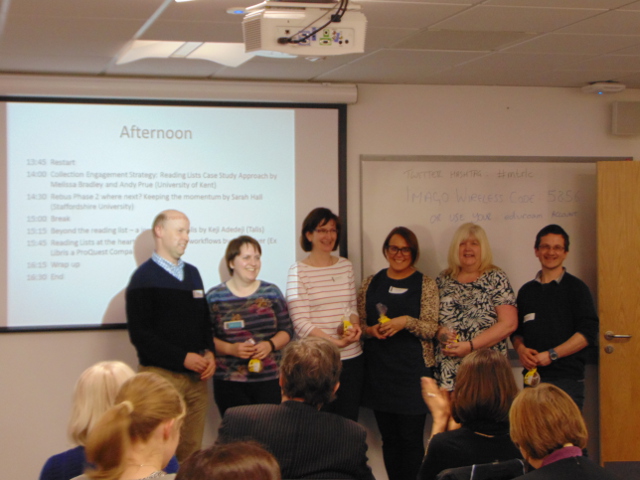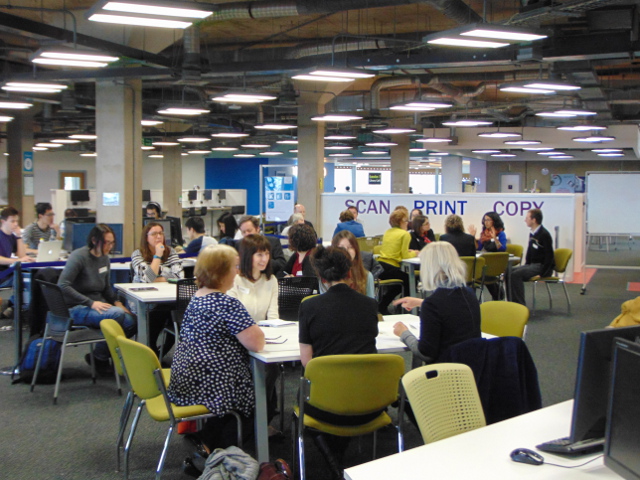Meeting the Reading List Challenge – Event Report
The Event
Meeting the Reading List Challenge was held for the 6th year running at Loughborough University, as a two day conference on April 5th-6th 2016. Meeting the Reading List Challenge brings together librarians, developers and suppliers to discuss the current issues relating to reading lists; this year the event focused on the challenges of implementation, engagement and best practice.
This conference report is structured thematically, exploring some of the key ideas from the event, alongside my own personal reflections.
The programme featured a mix of presentations and workshops, from both university library staff and reading list systems suppliers. I particularly enjoyed the inclusion on the programme of suppliers as speakers rather than just exhibitors with a stand, as it allowed opportunity to learn more about the functionality of the different systems currently available. Presentations from the event are available online.i A Storify of tweets from the event has been created by David Melkevik from Cardiff University, which offers an overview of the commentary and discussions from attendees on Twitter over the two days.ii
Key Themes
Implementation Journeys
Several speakers on the programme talked about their own organisations implementation journey for reading list management systems. The challenges of implementing a reading list system alongside other major organisational change were discussed by several speakers. It is clear that adopting a reading list system is a big organisational change in itself, and might not work if your organisation is also undergoing a restructure or implementing other new systems. A lot can be learned about reading list management systems from the implementation journeys of different organisations, even for those of us with already established systems. I have not been part of the implementation process for a new system in a university library so it was interesting to hear about the experience of those who have.
Andrew MacDonald talked about the impact of organisational change on implementing a reading list system at De Montfort University, sharing ideas for ways to overcome the challenges of resistance to change and technical issues. Capturing the support of students was one successful strategy for De Montfort University to address these issues.
Sarah Rayner and Olivia Walsby from the University of Manchester shared their story of unsuccessful reading list system implementation and the lessons learned for going forwards. Organisational change and technological readiness were large contributing factors. A strategy informed by research will be a key focus for the University of Manchester going forward with reading lists to ensure the system meets the needs of the organisation.
Monica Crump from the National University of Ireland, in Galway, also focused on the importance of organisational culture when implementing a reading list system. Monica suggested that it is crucial that the entire organisation is on board with the change. Making a new system attractive to academics was crucial and streamlining processes was key to success. For Monica, organisational restructure was also an issue but it was used as an opportunity to create a team to support reading lists within the library.
Cathy Murr and Lyn Porteous from Kingston University talked about working with a supplier as a development partner when implementing Leganto as their reading list system. They talked about the process of implementing a system, as a development partner, from the initial discussions to rolling out the product. At Kingston, a main challenge was managing the expectations of staff and students, using a system still under development, which is still an unfinished product.
Staff and Student Engagement
Engagement with reading list systems appears to be a hot topic for university libraries at the moment. Almost everyone at the event spoke of user engagement challenges for their reading list system, both staff engagement and student engagement, and several presentations focused on the issues of engagement. Strategies to get academic staff more engaged in using reading list systems was a big issue for attendees at the event. Ideas shared about different types of training sessions, online support materials, and examples of best practice.
My presentation, delivered jointly with Alison Sharman, focused on the importance of refreshing marketing and engagement initiatives for reading list systems once reading lists have become business as usual in order to keep the momentum going. We shared ideas from our staff engagement plan for MyReading and also our Business School reading list project which involves my role as a dedicated reading list librarian for the school.
Student engagement was discussed by Rachel Fell and Nicola Ward from Manchester Metropolitan University, with a talk about a campaign to encourage students to read and make use of reading lists. They employed a wide variety of strategies from roving librarians, promotional events, posters, and videos to raise awareness amongst students of reading lists. Social media played a key role as part of the campaign. Manchester Metropolitan University also conducted a student survey to build a better picture of what students wanted from their reading lists.
Melissa Bradley and Andy Prue from the University of Kent discussed strategies for staff engagement, focusing on their idea to use student satisfaction as a hook to get staff interested in the system. It also was important to engage wide range of stakeholders, not just academic staff, recognising the role played by other staff across the university in creating reading lists. They have demonstrated the correlation between high quality reading lists and student satisfaction by pulling together reading list data and student satisfaction data as evidence and conducting reading list case studies.
Policy and Processes
Policy and processes for reading list management was another theme which featured in most talks over the two day event, with everything from training plans, library workflows and reading list policies being discussed. A particular hot topic issue was establishing responsibility for updating and managing reading lists; is it the responsibility of the academic or a service provided by the library?
Claudio Svaluto from the University of Essex highlighted the challenges of establishing processes for reading lists, in particular establishing whether academics or the library should take responsibility for creating and updating reading lists. Sarah Rayner and Olivia Walsby discussed the difficulties in implementing policy and processes for reading lists. They shared findings of research conducted with academic staff which highlighted concerns about increasing regulation, additional administration work, more box ticking and a push towards conformity within academia.
Sara Hafeez from the University of Westminster also discussed reading list processes, focusing on the training, communication and documentation. Sara is the reading list co-ordinator for the university alongside her role as an academic liaison librarian. Sara shared a plan for delivering training, support, advocacy and communications about reading lists, across different library teams at Westminster. Sara’s presentation highlighted the importance of flexibility in reading list training and processes when supporting diverse subject areas. Clear and well documented library workflows were also highlighted as important.
Sarah Hall from Staffordshire University talked about keeping the momentum going once a system is in place, and looked at how they are going to achieve their aims for reading lists going forwards. Better policy and processes were a key part of this; for example they plan to rework ordering processes, develop a collection management policy which includes reading lists, and establish the roles and responsibilities for updating and managing reading lists.
Reading List Best Practice
Reading list best practice was discussed throughout the two days, with ideas being shared about how we can make best use of our reading list systems and encourage academics to use them to their full potential. Jo Dobson and Deborah Taylor from Sheffield Hallam delivered a workshop about creating engaging reading lists. In groups we were given big pieces of paper, pens and lots of items to go on a reading list, and asked to design a reading list which would be engaging to students. Each group took a different approach to structuring and annotating their reading list which highlights the many possibilities our academics are faced with when setting up a reading list. Ideas were discussed about ways the library could help facilitate training to ensure academics are equipped with skills and knowledge to create, better and more engaging reading lists. The conversations about reading list best practice continued into lunch and breaks with delegates sharing thoughts about the increasing need to address pedagogical issues within reading list training, rather than just basic instructional training.

Winners of the group activity to design a new reading list
System Developments
New developments in reading list systems were highlighted in the presentations delivered by representatives of Talis (Talis Aspire), ExLibris (Leganto) and PTFS Europe (Rebus List). These presentations proved to be an enlightening opportunity to learn more about the other commercial options available on the market. The University of Huddersfield uses an in-house system MyReading so it always interesting to find out more about the systems other organisations are using. My career background is archives, not academic libraries, so my knowledge of other reading lists systems is limited meaning the opportunity to learn more was highly valued.
Open Data
Martin Hamilton from JISC discussed open data for reading lists which led into a group workshop about the potential of open reading list data for libraries, academic faculties and institutions. Martin introduced the concept of open data in higher education, and the possibilities for reading lists. Examples of projects utilising open data included BookMart which is a project about using open data to help students source the books they need in the most cost effective wayiii. In groups we then discussed the possible uses of open reading list data in addition to supporting students, and of course the potential barriers for having open reading list data. One of the main concerns raised relating to open reading list data was the issue of intellectual property; are reading lists the intellectual property of academics or institutions?; are reading lists an asset with competitive value which institutions would not be willing to share?

One of the two group activity breakout sessions
Conclusion
Before attending Meeting the Reading List Challenge, I wasn’t sure how much there was to say about reading lists, to keep a two day event fresh and interesting. It turns out there is a lot to talk about when it comes to reading lists. Conversations continued over dinner, breakfast and on the train home confirming that reading list management remains a complex and challenging issue for libraries. Meeting the Reading List Challenge provided an excellent forum for sharing ideas, solving problems and reassuring ourselves that we are not alone in the challenges we face.
